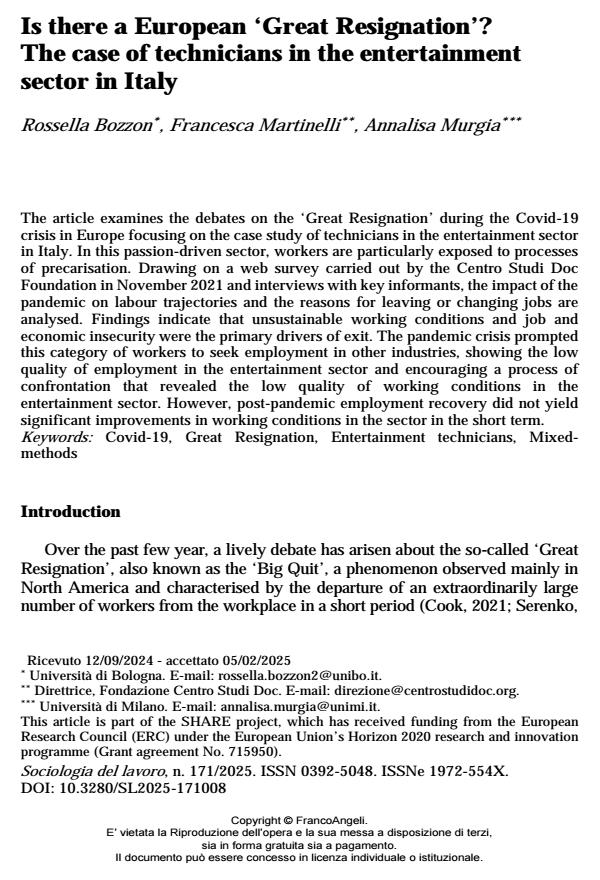Is there a European ‘Great Resignation’? The case of technicians in the entertainment sector in Italy
Titolo Rivista SOCIOLOGIA DEL LAVORO
Autori/Curatori Rossella Bozzon, Francesca Martinelli, Annalisa Murgia
Anno di pubblicazione 2025 Fascicolo 2025/171
Lingua Inglese Numero pagine 21 P. 165-185 Dimensione file 348 KB
DOI 10.3280/SL2025-171008
Il DOI è il codice a barre della proprietà intellettuale: per saperne di più
clicca qui
Qui sotto puoi vedere in anteprima la prima pagina di questo articolo.
Se questo articolo ti interessa, lo puoi acquistare (e scaricare in formato pdf) seguendo le facili indicazioni per acquistare il download credit. Acquista Download Credits per scaricare questo Articolo in formato PDF

FrancoAngeli è membro della Publishers International Linking Association, Inc (PILA), associazione indipendente e non profit per facilitare (attraverso i servizi tecnologici implementati da CrossRef.org) l’accesso degli studiosi ai contenuti digitali nelle pubblicazioni professionali e scientifiche.
The article examines the debates on the ‘Great Resignation’ during the Covid-19 crisis in Europe focusing on the case study of technicians in the entertainment sector in Italy. In this passion-driven sector, workers are particularly exposed to processes of precarisation. Drawing on a web survey carried out by the Centro Studi Doc Foundation in November 2021 and interviews with key informants, the impact of the pandemic on labour trajectories and the reasons for leaving or changing jobs are analysed. Findings indicate that unsustainable working conditions and job and economic insecurity were the primary drivers of exit. The pandemic crisis prompted this category of workers to seek employment in other industries, showing the low quality of employment in the entertainment sector and encouraging a process of confrontation that revealed the low quality of working conditions in the entertainment sector. However, post-pandemic employment recovery did not yield significant improvements in working conditions in the sector in the short term.
L’articolo esamina il dibattito sulle Grandi Dimissioni durante la crisi legata al Covid-19 in Europa, concentrandosi sul caso dei tecnici nel settore dello spettacolo in Italia. In questo settore, in cui la componente della passione per il proprio lavoro è molto rilevante, lavoratori e lavoratrici sono particolarmente esposti/e ai processi di precarizzazione. Sulla base di un’indagine web condotta dalla Fondazione Centro Studi Doc nel novembre 2021 e di una serie di interviste con testimoni privilegiati, viene analizzato l’impatto della pandemia sulle traiettorie lavorative e le ragioni per lasciare o cambiare lavoro. I risultati indicano che le principali ragioni di abbandono del settore sono le condizioni di lavoro insostenibili e l’insicurezza lavorativa ed economica. La pandemia ha costretto questa categoria di soggetti a cercare lavoro in altri settori, mettendo in luce la bassa qualità del lavoro nel settore dello spettacolo. Comunque, la ripresa dell’occupazione nel periodo post-pandemia non è stata accompagnata da un sostanziale miglioramento delle condizioni di lavoro nel settore nel breve periodo.
Parole chiave:Covid-19, grandi dimissioni, tecnici dello spettacolo, mixed methods
Rossella Bozzon, Francesca Martinelli, Annalisa Murgia, Is there a European ‘Great Resignation’? The case of technicians in the entertainment sector in Italy in "SOCIOLOGIA DEL LAVORO " 171/2025, pp 165-185, DOI: 10.3280/SL2025-171008